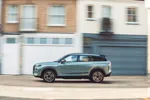Bodyshops will need to start specialising in a smaller number of marques because of the growing complexity of vehicles and the need for investment in tooling and training.
Paul Buckingham, country manager and key account manager at BASF, the supplier of R-M and Glasurit refinish paints, believes there will also be a swing away from insurance company approvals towards manufacturer approvals.
“It will give bodyshops more long-term security, a better mix of business and an enhanced labour rate,” Buckingham said.
“The manufacturer wants to sell parts and keep the customer. They have to ensure the customer experience is the same.
“We will also get to a situation where bodyshops specialise on four or five brands due to the investment in tooling and skills. They won’t be able to repair all brands.”
Glasurit has enjoyed three years of growth with 25% of its business in new markets, while R-M has started to recover market share after losing the Royal Bank of Scotland bodyshop business on tender.
New business includes commercial vehicles, which makes up 15% of Glasurit’s total business, and PDI which has grown from zero to 10% of business within three years.
“There is a lot of potential for further growth in those markets,” Buckingham said.
He anticipates a sea-change in paint products in the coming years, pointing to R-M’s Carizzma paint which is targeted at the car modifying market. It was launched in the UK towards the end of last year.
The R-M research department is working on paint slurry, a high concentrate, high coverage gloss that covers in a few microns rather than a couple of coats.
“Waterbased paint was developed because it could be used within the existing bodyshop environment,” Buckingham says.
“These new paints will need some adaptation of nozzles, but they will be added value for the bodyshop. And that underpins everything we do.”
Bodyshops: The need to specialise
- By
- |
- 13 February 2009














Login to comment
Comments
No comments have been made yet.